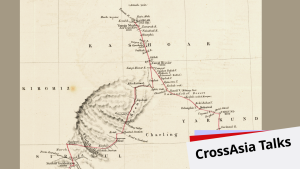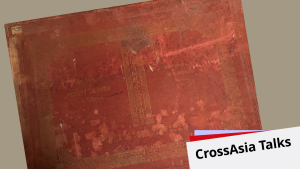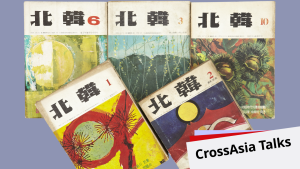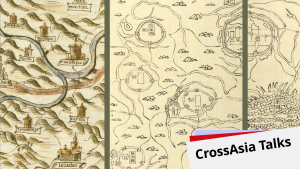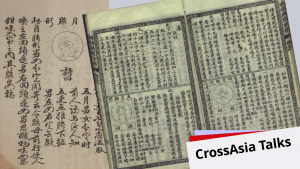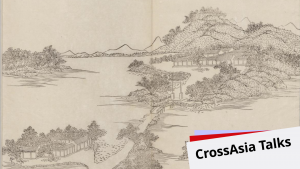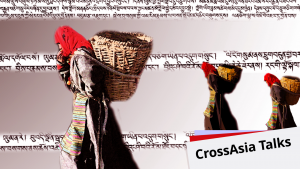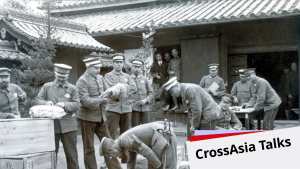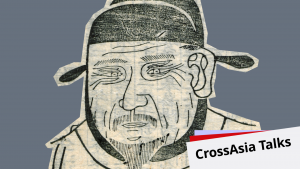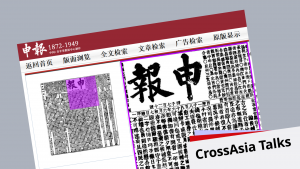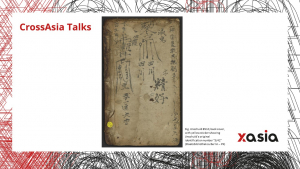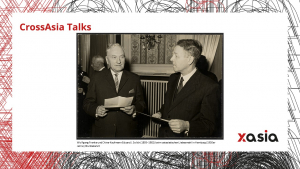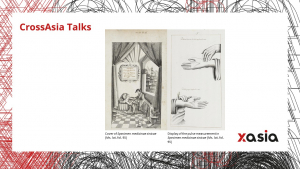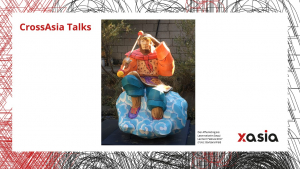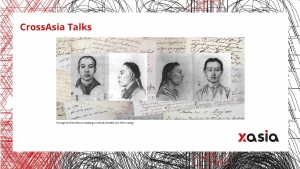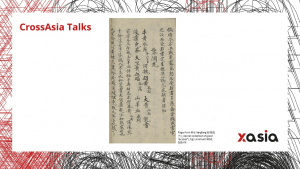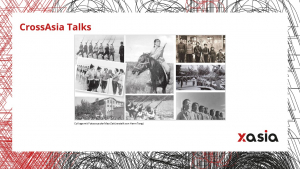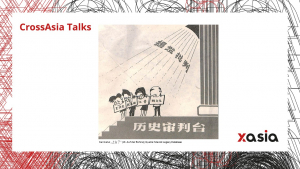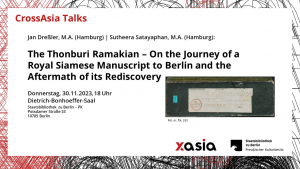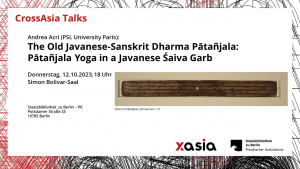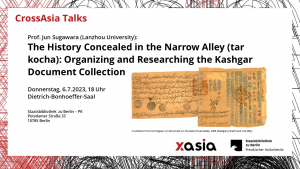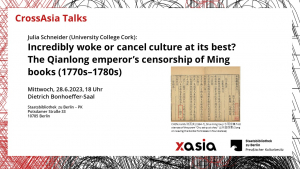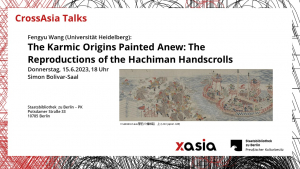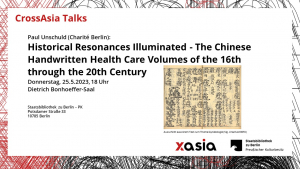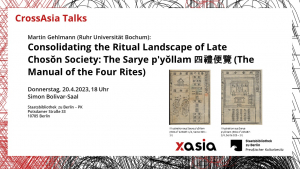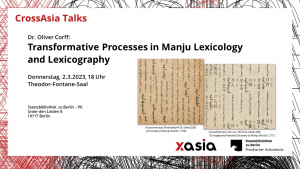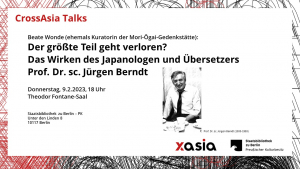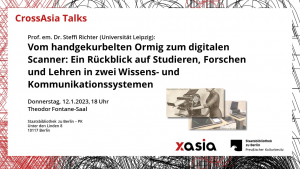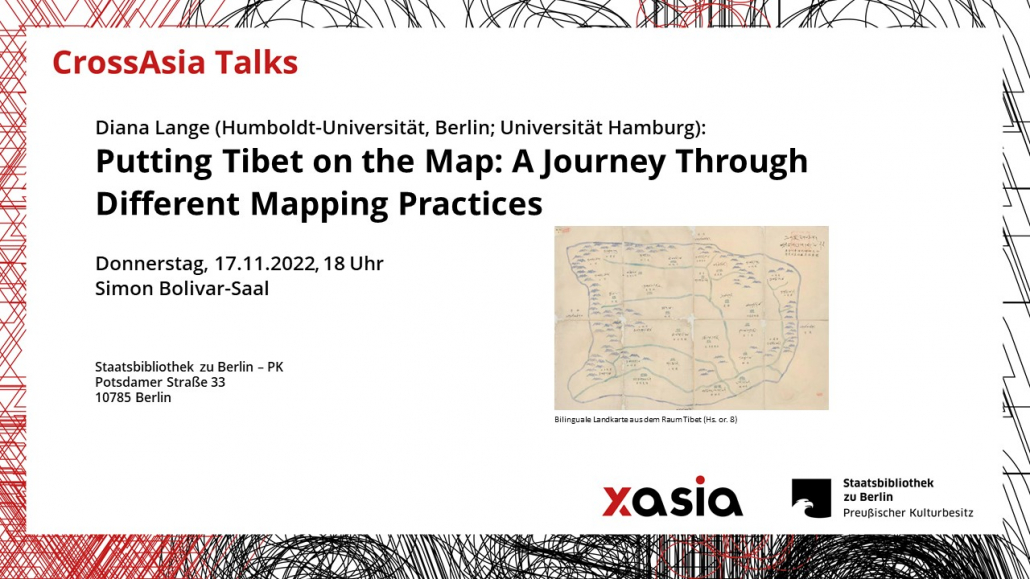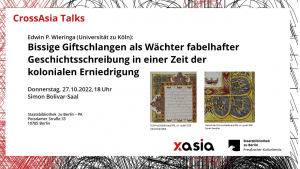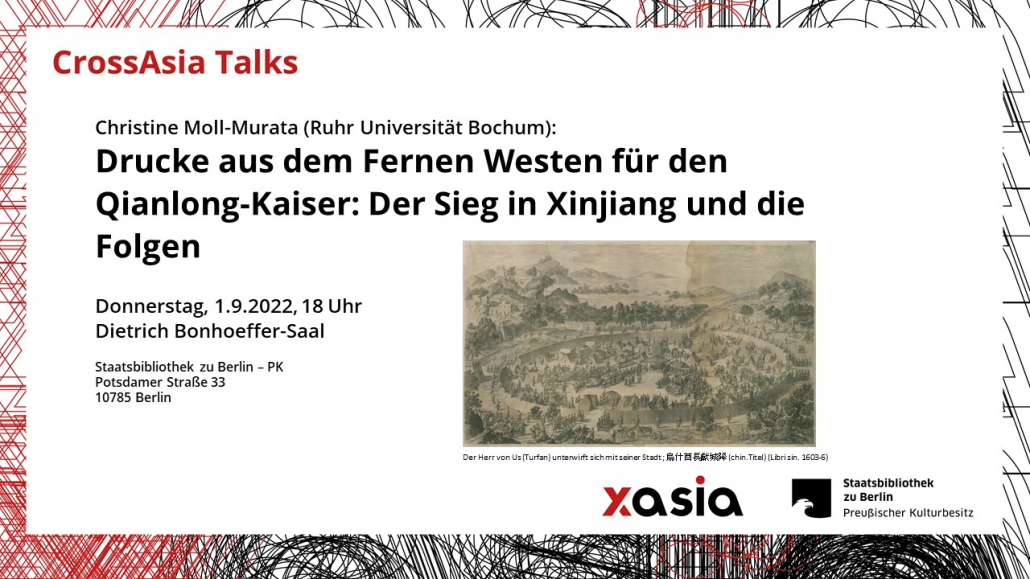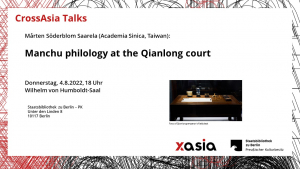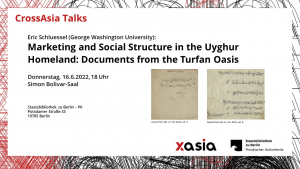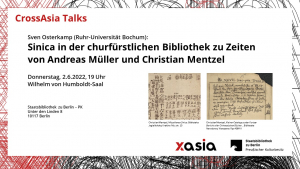Die Ostasienabteilung der Staatsbibliothek zu Berlin feierte 2022 drei wichtige Jubiläen: Christian Mentzels 400. Geburtstag (erster Kurator unserer Sinica-Sammlung), den 100. Jahrestag ihrer Gründung sowie 70 Jahre Förderung durch die Deutsche Forschungsgemeinschaft (DFG). Aus diesem Anlass wurde im Juni 2022 eine hybride Vortragsreihe unter dem Namen „CrossAsia Talks“ ins Leben gerufen. Im Fokus der Vorträge stehen Objekte und Themen unserer Sammlungen im weitesten Sinne. Forscher:innen und Kolleg:innen aus Deutschland, Europa, Asien und den USA referieren zu den frühesten Ergebnissen der Beschäftigung mit den ersten chinesischen Beständen in der kurfürstlichen Bibliothek, südost- und zentralasiatischen Handschriften, medizinhistorischen Texten und Forschungsergebnissen aus Kooperationsprojekten der Ostasienabteilung mit der Wissenschaft. Sie stellen zukunftsweisende Projekte, Techniken und Ideen vor, wie mit unserer Sammlung digital gearbeitet wird und wie zukünftige Herausforderungen aussehen. Wir laden Sie herzlich dazu ein an den Vorträgen Online oder Offline bei uns in der Bibliothek teilzunehmen und freuen uns auf Ihr Kommen.
Die Aufzeichnungen der Vorträge finden Sie als Youtube-Videos im Archiv.
Kommende Vorträge
Hermann Kreutzmann (FU Berlin):
Passages to Kashgar and Yarkand – 19th century cross-mountain connections and relations
Donnerstag, 29. Januar 2026, ab 18 Uhr
The term ‘Silk Road’ first appeared in Carl Ritter’s ‘Geography of Asia’ in 1838 and was further developed and popularised by Friedrich Freiherr von Richthofen in 1877. Subsequently, geographical exploration and the search for economic advantages went hand in hand with imperial ambitions as interest increasingly focused on the Celestial Mountains and oases of the southern Silk Road. The Tianshan Mountains and Kashgar became coveted destinations for European explorers who were denied access to forbidden cities by local potentates. The prominent Berlin geographers Alexander von Humboldt and Carl Ritter motivated young scholars such as the Schlagintweit brothers to explore the roads to Kashgar and Yarkand. […] (Mehr)
Niklas Leverenz:
Resurfaced in our collection: The Lithographs of the East-Turkestan Engravings (Shanghai, 1891), originally printed in Paris between 1767 and 1774s
Donnerstag, 12. Februar 2026, ab 18 Uhr
Reproductions of the famous East Turkestan engravings made in Paris around 1770 were printed in Shanghai in 1891 using the then new technology of photolithography. About twenty sets of these prints seem to exist, but very little is known about them.
The collection of the Staatsbibliothek zu Berlin owns one set of these unique prints which it acquired in 1965. The set was misplaced but could just recently be reallocated with the help of an article published by the speaker of this session, Niklas Leverenz, […] (Mehr)
Martin Weiser (FU Berlin):
Closing in on the Unknown: Measuring DPRK/North Korea’s publication output traced through library holdings, ISBN and the domestic registration number
Donnerstag, 26. März 2026, ab 18 Uhr
Comparatively little is known about the DPRK, and its print publications remain a key source for academics. But little to no tools exist to deal with the limited but nonetheless overwhelming number of publications we now have access to and the diverse information they contain. This presentation will look at one particular kind of information those publications provide: changes in the country’s publication output. It begins with a comparison of library holdings in Seoul and the USA with the Staatsbibliothek zu Berlin, and then decodes information included in ISBN assignments and the domestic registration numbering gathered from several thousand print publications to provide new insights into changes in publication output. […] (Mehr)
Archiv
Mackenzie Cooley (Hamilton College, USA), Huiyi Wu (Centre Alexandre Koyré, Frankreich), Shih-Pei Chen (Max-Planck-Institut für Wissenschaftsgeschichte, Berlin):
Knowing an Empire: Early Modern Chinese and Spanish Worlds in Dialogue
Donnerstag, 4. Dezember 2025, ab 18 Uhr
This collective book, edited by Cooley and Wu, brings leading scholars across Latin American and Asian Studies to write about how two early modern, vast empires – the Spanish and the Chinbese, despite being, separated by thousands of miles, developed comparable systems to gather, order, and write knowledge about their local worlds. Through a new methodology of “juxtapositional comparison,” this book reads the difangzhi 地方志 (local gazetteers) of China and the relaciones geográficas of the Spanish world in parallel. […] (Mehr)
Joan Judge (York University):
New Conceptions: Modes of Knowing in Chinese Encyclopedias for Everyday Life
Donnerstag, 20. November 2025, ab 18 Uhr
Scholars have debated the epistemic status of the Comprehensive Compendia of Myriad Treasures (wanbao quanshu 萬寶全書), a genre of daily-use texts widely reproduced in China from the sixteenth through the early twentieth centuries. This presentation seeks to deepen our understanding of both the content and the potential readership for these texts in the late imperial and Republican Chinese contexts. It does so by engaging in a close and contextualized examination of one section of the compendia that remained remarkably stable over the course of this period, the section on “Pregnancy” (Zhongzi men 種子門). […] (Mehr)
Maria Faust:
Digital Senses, Analogue Landscapes? – A De-Westernized Approach of Landscape Epistemologies in Germany and China
Donnerstag, 23. Oktober 2025, ab 18 Uhr
What are the epistemologies of sensory perception of landscape under the conditions of deep mediatization in both Germany and China?
Consequently, the research objective will unpack how digital media has changed our sensory perceptual experience of landscape and the world we live in and how this relates to aura and authenticity formation of landscape. Through the understanding of visual, auditory, tactile, olfactory, gustatory and equilibrium-related alterations caused by the virtual, will it be possible to contribute to an understanding of the sensory experience of the non-mediated landscape sphere. The findings suggest that the dominance of sight and sound leads to a vanishing of other sensory input forms and landscape perception becomes increasingly two-dimensional. […] (Mehr)
Marlene Erschbamer:
Reading Outside the Lines – Motherhood and the Roles of Mothers within the Barawa Kagyu Tradition of Tibetan Buddhism
Donnerstag, 25. September 2025, ab 18 Uhr
Motherhood is a complex and highly ambivalent role for women. It becomes even more complicated when the roles of mothers are examined through a religious lens. This applies also to the image of motherhood in Tibetan Buddhism. To get an idea of motherhood through the centuries, it is helpful to read between the lines, but also outside the lines, of Tibetan texts. […] (Mehr)
Sarah Panzer (Missouri State University):
Documenting the Lives of Germany’s ‘Forgotten’ Prisoners of War (POWs): Photographs in the Bandō-Sammlung
Donnerstag, 4. September 2025, ab 18 Uhr
On 7 November, 1914 the German garrison at Tsingtao (Qingdao), following a brief siege, surrendered to Japanese and British colonial troops. The German servicemen captured at Tsingtao were subsequently interned in Japan for the duration of the First World War. After early temporary arrangements—including barracks dating back to the Russo-Japanese War—proved inadequate, a series of POW camps were constructed across Japan. These camps became a kind of wartime ‘Ersatz Deutschland’ for their occupants, with multiple musical and theatrical ensembles organized within the various camps, as well as teams and training groups for popular sports and leisure activities. […] (Mehr)
Lukáš Kubík (Karls-Universität, Prag):
„(Un)official Korean Sources on late Koryŏ in the Staatsbibliothek zu Berlin’s East Asian Collection“
Montag, 5. Mai 2025, ab 18 Uhr
In this lecture, I will talk about Korean historical sources held in the East Asian collection of the Staatsbibliothek zu Berlin, focusing on both official and unofficial narratives from the late Koryŏ period onward. While official histories document key events, a range of unofficial sources offers unique, often personal perspectives that enrich our understanding of the past. Among these are educational texts used in private academies, or Sŏwŏn (書院), which compile Korean history from earlier works to create accessible overviews for students. […] (Mehr)
Elisabeth Kaske (Universität Leipzig):
„The plight of expectant officials through the lens of the daily Shenbao“
Donnerstag, 27.03.2025 ab 18 Uhr
State bureaucrats became an object of ridicule in many literatures of the late nineteenth and early twentieth centuries, think of Gogol or Kafka or Li Boyuan’s Officialdom Exposed. However, they are not normally an object of compassion. This talk explores how the Shanghai daily newspaper Shenbao treated a very specific group of officials, namely the expectant officials of late Qing China.
Their numbers had become inflated by the widespread sale of official rank since the 1850s. Although they sported official titles like “magistrate” or “prefect” or “circuit intendant,” their employment situation was often precarious, with the luckier ones employed in newly established provincial bureaus. By the early 1900s, this system of parallel bureaucracies became increasingly seen as an aberration, as one commentator put it: “Foreigner are telling jokes that talent in China is defined exclusively as ‘expectant circuit intendant’. When I heard this, it makes me sweat.” (Shenbao 1907/02/22) […] (Mehr)
Thies Staack (Universität Hamburg):
„The Provenance of the Chinese Medical Manuscripts in the Unschuld Collection: New Evidence from an Unpublished Acquisition Notebook“
Donnerstag, 20.02.2025 ab 18 Uhr
The provenance of the Chinese medical manuscripts collected by Paul Ulrich Unschuld has long remained an open question. Even the catalogue of the collection, published in 2012, offers very little information in this respect. The present lecture introduces a new source of provenance information: an unpublished acquisition notebook in which Unschuld recorded the date and place of purchase for nearly 800 manuscripts he acquired between 1996 and 2006. By synthesising the data contained in the notebook and in the documents kept in the archives of the Ethnological Museum of Berlin and the Berlin State Library, it has been possible to obtain provenance information on 490 manuscript volumes, which are now listed under 471 separate shelf marks in the “Unschuld collection” of the Berlin State Library. […] (Mehr)
Franz Xaver Erhard (Universität Leipzig):
„From Print to Digital: Making Available Tibetan Newspapers as a Historical Source“
Donnerstag, 12.12.2024 ab 18 Uhr
The Sino-Tibetan history of the 1950s and 1960s is relatively unknown and highly contested. At the same time, sources on the period are scarce and local archives – if they exist – are generally closed to outside researchers. The few existing collections, including the one at the Berlin State Library (german: Staatsbibliothek zu Berlin), of Tibetan newsprint and contemporary publications offer rare insights into the events but also the official presentation of events at the very time when they were taking place. The UK-German research project Divergent Discourses takes up this opportunity to study the events and narratives in newspapers of the period to understand how they became woven into cohesive yet diverging discourses on Tibet. […] (Mehr)
Stefan Messingschlager (Helmut-Schmidt-Universität/Universität der Bundeswehr Hamburg):
„Pekingologie und wissenschaftliche China-Expertise in Deutschland nach 1949: Zur Scharnierfunktion des Sinologen Wolfgang Franke (1912–2007)“
Donnerstag, 28.11.2024 ab 18 Uhr
Mit der Ausrufung der Volksrepublik China im Oktober 1949 wurde das Land für westliche Gesellschaften innerhalb kurzer Zeit zu einer Art Blackbox. In den meisten westlichen Staaten entwickelte sich vor diesem Hintergrund die Praxis der „China-Expertise“ – eine vielfältige, auf den öffentlichen Raum gerichtete Tätigkeit des Deutens, Beratens und Vermittelns, die unterschiedlichste Formen annahm: von der Deutung und Vermittlung im öffentlichen Diskurs über Politikberatung bis hin zur vermittelnden Praxis im transnationalen Austausch in den Bereichen Diplomatie, Wirtschaft und Kultur. […] (Mehr)
Gianna Pomata/Marta Hanson:
„A Sample of Chinese Medicine for 17th-Century Europe“
Donnerstag, 7.11.2024 ab 18 Uhr
Our lecture will focus on a book that played a key role in the introduction of Chinese medicine to Europe: Specimen Medicinae Sinicae sive Opuscula Medica ad Mentem Sinensium (A Sample of Chinese Medicine, or Brief Medical Works According to the Mind of the Chinese: Frankfurt am Main, 1682). The only extant manuscript of this book and some preparatory materials are held at the Staatsbibliothek in Berlin. Specimen included various writings, some presented as translation from the Chinese into Latin. Equipped with illustrations drawn from Chinese sources, the book dealt with basic Chinese physiological, anatomical, and therapeutic notions, mostly related to pulse medicine. No European authors or translators were acknowledged, except for the editor Andreas Cleyer, a German medical practitioner in the service of the Dutch East India Company in Batavia (present-day Jakarta). […] (Mehr)
Vladimir Glomb (Freie Universität Berlin):
„The Master said (in Korean)…: Vernacular exegesis (ŏnhae) and Confucian classics“
Donnerstag, 17.10.2024 ab 18 Uhr
The so-called Sasŏ ŏnhae 四書諺解 (Vernacular Exegesis of the Four Books) 1820 edition from the Coreanica collection of the Berlin State Library (shelfmark Libri cor. 12) is a fine example of texts illustrating problems related to language strategies employed by Chosŏn state and literati in rendering texts written in the Classical Chinese into their vernacular versions. The present talk will focus on the purpose, authority, and canonicity of these vernacular versions of the Confucian classics. […] (Mehr)
Barbara Wall (Universität Kopenhagen):
„The Dynamic Essence of Transmedia Storytelling: A Graphical Approach to the Journey to the West in Korea“
Donnerstag, 26.09.2024 ab 18 Uhr
This talk challenges many typical assumptions about popular literary classics via analysis of sixty Korean variations of The Journey to the West, including novels and poems, but also films, comics, paintings, and dance performances. In contrast to the typical assumption that literary classics like The Journey to the West are stable texts with a single original, Barbara Wall approaches The Journey to the West as a dynamic text comprised of all its variations. […] (Mehr)
Dr. Xueqi Jiang (Universität Nanjing, China):
„Zur abenteuerlichen Lebensgeschichte der beiden ersten Chinesen in Deutschland“
Donnerstag, 18. Juli 2024 ab 16 Uhr
Asseng und Ahok, beide in den 1790er Jahren am Perlflussdelta geboren, waren die ersten Chinesen, die sich in Deutschland langfristig aufhielten. Seit ihrer Ankunft Ende 1821 in Hamburg wurden sie von einem holländischen Kaufmann herumgeführt und öffentlich gegen Geld ausgestellt. Obwohl es sich nur um zwei vergleichsweise unbedeutende Personen handelte und eine sogenannte „Menschenausstellung“ schon nach dem damaligen Maßstab als entwürdigend empfunden wurde, konnten die beiden Chinesen die Aufmerksamkeit des gelehrten Publikums in Deutschland auf sich ziehen […] (Mehr)
Forrest McSweeney:
„Military Medical Legacy: The Impact of Military Drug Distribution on the Pharmaceutical Field in Qing and Early Republican China“
Donnerstag, 20. Juni 2024 ab 18 Uhr
This presentation will focus on the impact of military drug distribution in the 18th century high-Qing on medical discourse and practice through the 19th century and into the Republican Period. The period from the late 18th to early 19th century was one of continued territorial expansion and rebellion suppression by the Qing empire under the reigns of the emperors Qianlong (1735-1796) and Jiaqing (1796-1820). To maintain the health of their soldiers, the Qing maintained a continuous pipeline of single-ingredient drugs from provincial markets to its Green Standards garrisons lüyingbing 綠營兵, particularly in rebellious areas in southern China. […] (Mehr)
TANG Sanjiao (University of Auckland, Neuseeland):
„Lives in Mao-Era Militias under the Mass Mobilisation and Militarisation Context“
Dienstag, 14. Mai 2024
In China today, the younger generations are having militarised experiences. Admittedly, military training is a routine thing for students in many countries. Currently, the reviving nationalist trend is making the Chinese young people’s military training different. On the video-sharing platforms popular in China, such as Douyin (the Chinese version of TikTok), with keywords like “students’ military training,” tens of thousands of videos are well-received. As vividly shown in the videos, the Chinese young people, including children in kindergartens, were learning to have simulative combat with imaginary enemies. Indulging them in burning passion, the younger generations feel as if they were glorious soldiers fighting for the nation. […] (Mehr)
Amanda Shuman (Albert-Ludwigs-Universität Freiburg):
„Handling „lingering historical issues“: Using the Maoist Legacy database to examine justice in the post-Mao era“
Donnerstag, 18. April 2024
The Maoist Legacy Database (MLD) was initially created as part of the ERC-project, „The Maoist Legacy: Party Dictatorship, Transitional Justice, and the Politics of Truth,“ directed by Daniel Leese at the University of Freiburg, Germany. Over the course of 5 years (2014-2019), the project team collected and curated documents for the database related to the research topic and beyond. This talk will introduce the kinds of materials in the database and research possibilities through a discussion of the primary resulting research projects, three outstanding PhD dissertations […] (Mehr)
Jan Dreßler und Sutheera Satayaphan:
„The Thonburi Ramakian – On the Journey of a Royal Siamese Manuscript to Berlin and the Aftermath of its Rediscovery“
Donnerstag, 30. November 2023
On November 4th, 1834, the Royal Library in Berlin received a parcel from Singapore that contained twenty-two paper and palm leaf manuscripts, as well as printed books, written in nine Asian languages. The shipment had been dispatched by the German missionary Karl Gützlaff, who, at the request of the library, had collected manuscripts since his arrival in Asia in 1827. […] (Mehr)
Dr. Andrea Acri:
„The Old Javanese-Sanskrit Dharma Pātañjala: Pātañjala Yoga in a Javanese Śaiva Garb“
Donnerstag, 12. Oktober 2023
The 15th-century codex unicus containing the Old Javanese text Dharma Pātañjala (MS Schoemann I 21, Staatsbibliothek zu Berlin, 89 leaves) is an important and in many respects unique object. Besides documenting a rare tradition of palmleaf manuscripts from West Java, it is also among the oldest manuscripts recovered in the Indonesian archipelago. […] (Mehr)
Prof. Jun Sugawara (Lanzhou University):
„The History Concealed in the Narrow Alley (tar kocha): Organizing and Researching the Kashgar Document Collection“
Donnerstag, 6.Juli 2023
From the 21st century onward, one of the remarkable changes in Central Eurasian historical studies has been the investigation of indigenous documents alongside traditional historiographies. These sources, which include Islamic legal documents relating to real estate sales, debts, commercial transactions, legal disputes, religious donations (waqf), as well as personal memoranda, letters, accounts, and miscellaneous pieces of paper, have the potential to enrich historical research beyond conventional political and incident histories into a more nuanced understanding of social and economic histories. (Mehr)
Dr. Julia Schneider (University College Cork):
„Incredibly woke or cancel culture at its best? The Qianlong emperor’s censorship of Ming books (1770s–1780s)“
Mittwoch, 28. Juni 2023
Did the Qianlong Emperor of the Manchu Qing Dynasty (1636/1644-1912) issue an anti-racist campaign when he forbade Chinese books that discredited non-Chinese others? In my lecture, I aim to answer this question by introducing passages and terms that made Qing officials collect books for censorship. I focus on the so-called literary inquisition (c. 1772–1788) of the Qianlong emperor which particularly censored books from Ming times (1368–1644). Among other criteria, censors were liable to collect and destroy books that contained partial or derogatory descriptions of the Jurchen (the Manchus’ ancestors), Liaodong (the region of Manchu origin), and non-Chinese peoples in the northwest (the Manchus’ allies). (Mehr)
Fengyu Wang (Universität Heidelberg):
„The Karmic Origins Painted Anew: The Reproductions of the Hachiman Handscrolls“
Donnerstag, 15. Juni 2023
Hachiman engi 八幡縁起 or The Karmic Origins of Hachiman, narrates Empress Jingū’s 神功皇后mythical conquest of Korea, the birth of her son, Emperor Ōjin 応神天皇, and his miraculous manifestations as the deity Hachiman, literally “eight banners.” As the Hachiman veneration became widespread since the late thirteenth century, illuminated handscrolls of his inception legend were reproduced and dedicated to the newly founded Hachiman-gū Shrines across the country. (Mehr)
Prof. Dr. Paul U. Unschuld (Charité Berlin):
„Historical Resonances Illuminated – The Chinese Handwritten Health Care Volumes of the 16th through the 20th Century (Unschuld Collection, Staatsbibliothek zu Berlin) as Resources of Knowledge“
Donnerstag, 25. Mai 2023
With the acquisition of the „Sammlung Unschuld“ the Staatsbibliothek zu Berlin has significantly expanded its holdings of East Asian manuscripts. The Sammlung Unschuld includes more than 1000 volumes, dating from the 16th century to the mid-20th century, of personal records on health care, handwritten by professional physicians and itinerant healers, by the owners of apothecary shops and private households, by exorcists and Buddhists, students and other concerned individuals. (Mehr)
Dr. Martin Gehlmann (Ruhr-Universität Bochum):
„Consolidating the Ritual Landscape of Late Chosŏn Society: The Sarye p’yŏllam 四禮便覽 (The Manual of the Four Rites)“
20. April 2023
Sarye p’yŏllam (四禮便覽) is a four-volume Korean ritual manual compiled by scholar-official Yi Chae 李縡 (1680–1746) in 1746. The manual is one of the most elaborate attempts to create a practical handbook of the family rituals that defined both life and death in the Confucian society of the late Chosŏn dynasty. It offers both theoretical background and practical advice on the ceremonies that accompanied the four most important events in individual and family life: coming-of-age, marriage, funeral rites and ancestor worship. (Mehr)
Dr. Oliver Corff:
„Transformative Processes in Manju Lexicology and Lexicography“
2. März 2023
The Han-i araha Manju gisun-i buleku bithe (Dictionary of Manju Words) of 1708, offering approx. 12,100 entries, is a major milestone in Manju lexicology and lexicography as it offers precise definitions of the meaning of Manju words, and beyond that, the concept and structure of knowledge and thought in the Manju world of the Qing empire. Its successor is the Han-i araha nonggime toktobuha Manju gisun-i buleku bithe (Enlarged and Revised Dictionary of Manju Words) of 1772, which offers approx. 18,655 entries, an apparent increase by more than 50% which, at first glance, confirms the word nonggime (“enlarged”) in the title of this dictionary. (Mehr)
Beate Wonde (ehemals Kuratorin der Mori-Ōgai-Gedenkstätte):
„Der größte Teil geht verloren? Das Wirken des Japanologen und Übersetzers Prof. Dr. sc. Jürgen Berndt“
9. Februar 2023
2023 wäre Jürgen Berndt 90 Jahre alt geworden. 30 Jahre nach seinem viel zu frühen Tod werden seine zahlreichen literarischen Übertragungen weiterhin rezipiert, sind Anregung und Maßstab für heutige Übersetzer:innen und werden von der wissenschaftlichen Fachwelt gleichermaßen geschätzt. Sein Wirken als Japanologe, Autor, Referent, als Impulsgeber und Motor in den Beziehungen zwischen der DDR und Japan ist 50 Jahre nach Aufnahme der diplomatischen Beziehungen zwischen der DDR und Japan nahezu vergessen. Nach einer Odyssee von Berlin nach Erfurt und 20 Jahre später wieder zurück nach Berlin gehört der Nachlass von Berndt zu den Beständen, die eher zufällig in die Staatsbibliothek zu Berlin kamen. (Mehr)
Prof. i.R. Dr. Steffi Richter (Universität Leipzig):
„Vom handgekurbelten Ormig zum digitalen Scanner: Ein Rückblick auf Studieren, Forschen und Lehren in zwei Wissens- und Kommunikationssystemen“
12. Januar 2023
In diesem Vortrag soll – anders als der Titel vielleicht suggeriert – nicht einfach nur technischer Fortschritt im wissenschaftlichen Arbeiten thematisiert werden. Vielmehr geht es um die paradoxe Kluft: zwischen wachsenden Informations- und Wissenspotentialen zum Einen und diese paralysierenden Zeitregimen zum Anderen; zwischen Textfluten bewirkenden Publikationsmöglichkeiten (und -zwängen) und immer mehr von „Kondensliteratur“ (Klaus Wagenbach) gefüllten Seminarbibliotheken; zwischen Beteiligungsversprechen und Entscheidungsmöglichkeiten, usw.
Und um den Versuch, diese Kluft in einem kleinen Lehrprojekt zu überwinden: die Geschichte vom „Inamura no hi“. (Mehr)
Illustrated Architecture (Birgit Tsuchiya und Bernhard Strackenbrock):
„Die 3D Digitalisierung der Typographia Sinica unter Einsatz der Fotogrammmetrie“
01. Dezember 2022
Andreas Müller (1630-1694) schenkte die Typographia Sinica der Kurfürstlichen Bibliothek bei seiner Verabschiedung aus dem Amt im Jahr 1685. Es handelt sich dabei um ein aus massivem Eichenholz gefertigtes Schränkchen, das in zehn Schubladen mehr als 3.000 Drucktypen, auf deren einer Seite chinesische Schriftzeichen eingeschnitten und auf deren anderer Seite mit Tinte Zahlen aufgetragen sind, enthält.
Die Typographia Sinica wird derzeit und für mindestens fünf Jahre im Humboldt Forum in Berlin im Rahmen des Ausstellungsbereichs Spuren des Ortes gezeigt. Im Sommer des Jahres 2019 ist sie durch die Firma Illustrated Architecture 3D digitalisiert worden. Im Vortrag wird das dabei angewandte Verfahren der Fotogrammmetrie thematisiert werden. (Mehr)
Dr. Diana Lange (Humboldt-Universität, Berlin):
„Putting Tibet on the Map: A Journey Through Different Mapping Practices“
17. November 2022
By taking a look at Tibet, it becomes particularly clear how much mapping processes can vary from culture to culture and just how different mapmakers’ interests can be. Depictions of Tibet vary, depending on what perspective was employed. The contrast between indigenous, Chinese and European points of view is striking here. In very simplified terms it can be stated that maps of Tibet made by Europeans look very abstract, maps made by the Chinese way look more pictorial but also include abstract elements and maps made by the Tibetans look like living landscapes. Based on selected geographical maps of Tibet that have been produced over the years by different agents, for different reasons, with different techniques and from different materials Diana Lange will to discuss in her talk how spatial information of a specific region was conveyed in different “cartographic languages” and how these different languages influenced each other. Amongst these maps are three newly discovered bilingual manuscript maps from the State Library of Berlin. (More)
Prof. Dr. Edwin P. Wieringa (Universität zu Köln):
„Bissige Giftschlangen als Wächter fabelhafter Geschichtsschreibung in einer Zeit der kolonialen Erniedrigung“
27. Oktober 2022
Die javanische Handschrift Ms. or. quart. 355 Serat Kandha beinhaltet legendäre Erzählungen in Gedichtform über die alte sagenumwobene Vergangenheit von Java. Der Duktus ist unverkennbar die Palastschrift von Yogyakarta, während der Buchschmuck auf dem Bifolium einige spezifische Elemente hat, die Yogyakarta als Herstellungsort identifizieren lassen. Nicht zu übersehen sind die (insgesamt sechs) Abbildungen von zwei schlangenartigen Fabelwesen, welche ursprünglich aus der indischen Mythologie (Sanskrit nāga) stammen, aber in ganz Südostasien bekannt sind. Sollten die an allen Richtungen platzierten Nagas, die alle ein weitgeöffnetes Maul mit spitzen Giftzähnen zeigen, ihre übliche Beschützerrolle spielen? Im Vortrag wird näher auf den historischen Hintergrund dieser Handschrift eingegangen, die kurz nach der Plünderung des Sultanspalasts von britisch-indischen Truppen (1812) angefertigt wurde. (Mehr)
Prof. Dr. Christine Moll-Murata (Ruhr Universität Bochum):
„Drucke aus dem Fernen Westen für den Qianlong-Kaiser: Der Sieg in Xinjiang und die Folgen“
01. September 2022
Eines der berühmtesten und frühesten Digitalisate der Ostasienabteilung der Staatsbibliothek Preußischer Kulturbesitz ist eine Sammlung von 64 Abdrucken von Schlachtenkupfern. Sie sind gut dokumentiert und erforscht. So werden die erhaltenen Kupferplatten derzeit im Ethnologischen Museum Berlin untersucht. Dieser Vortrag geht auf die erste Serie ein, die einzige, die im Ausland angefertigt wurde. Dabei liegt das Hauptaugenmerk auf der Darstellung des zweiten Teils der Xinjiang-Feldzüge, dem Krieg gegen die muslimischen Altishar-Khojas im Tarimbecken. Welche Gewichtung kommt den Kampfszenen und den Situationen von Unterwerfung und Sieg zu? Welches Menschenbild wird gezeigt, auch im Kontrast zu den Menschendarstellungen der anderen Schlachten? Neben einer kunsthistorischen Einordnung diskutiert der Vortrag die Historiographie dieser Epoche im Zusammenhang mit der Rolle eines frühen muslimischen Verbündeten der Qing, des Machthabers Huojisi bzw. Khojis Beg von Ush (gest. 1781). (Mehr)
Dr. Mårten Söderblom Saarela (Academia Sinica, Taiwan):
„Manchu philology at the Qianlong court“
04. August 2022
The late eighteenth century witnessed the flourishing of a brand of precise philological scholarship known as “evidential learning” (kaozheng xue or kaoju xue). In the hands of Chinese scholars from the lower Yangzi region, subjects ranging from classical learning to geography and mathematics were subjected to a first and foremost textual and historical form of research. The role of the Qing court, headed by the Manchu Qianlong emperor, in the emergence of this kind of scholarship has long been a matter of debate. Some have seen Qing imperial power as an inhibiting factor that pushed research into politically harmless discussions of textual minutiae, whereas others have recognized the importance of the court as a patron of “evidential learning.” Whatever the case, the Manchu political leadership remains on the sidelines of an ultimately Chinese project. (More)
Prof. Dr. Eric Schluessel (George Washington University):
„Marketing and Social Structure in the Uyghur Homeland: Documents from the Turfan Oasis“
16. Juni 2022
Newly discovered manuscripts from the State Library of Berlin reveal new facets of village life in the Uyghur homeland of Xinjiang, China (East Turkestan) in the 1890s. These documents show how ordinary merchants, artisans, and farmers navigated an economy that was increasingly oriented to the market and towards China proper. From merchants‘ notebooks, legal documents, and grain relief records, we see networks of market actors, even families, emerge. (More)
Prof. Dr. Sven Osterkamp (Ruhr-Universität Bochum):
„Sinica in der churfürstlichen Bibliothek zu Zeiten von Andreas Müller und Christian Mentzel – und ihr späterer Verbleib“
02. Juni 2022
Im Vortrag werden zuerst altbekannte, wie auch neuere Quellen zur Zusammensetzung der Berliner Sinica-Sammlung zu Zeiten von Andreas Müller und Christian Mentzel gegen Ende des 17. Jahrhunderts vorgestellt, um darauf zumindest exemplarisch ihren oft noch unklaren späteren Verbleib zu beleuchten. Im Fokus stehen dabei mehrere Fälle, für deren Schicksal offenbar Julius Klaproth im frühen 19. Jh. eine wesentliche Rolle zukommt. (Mehr)

